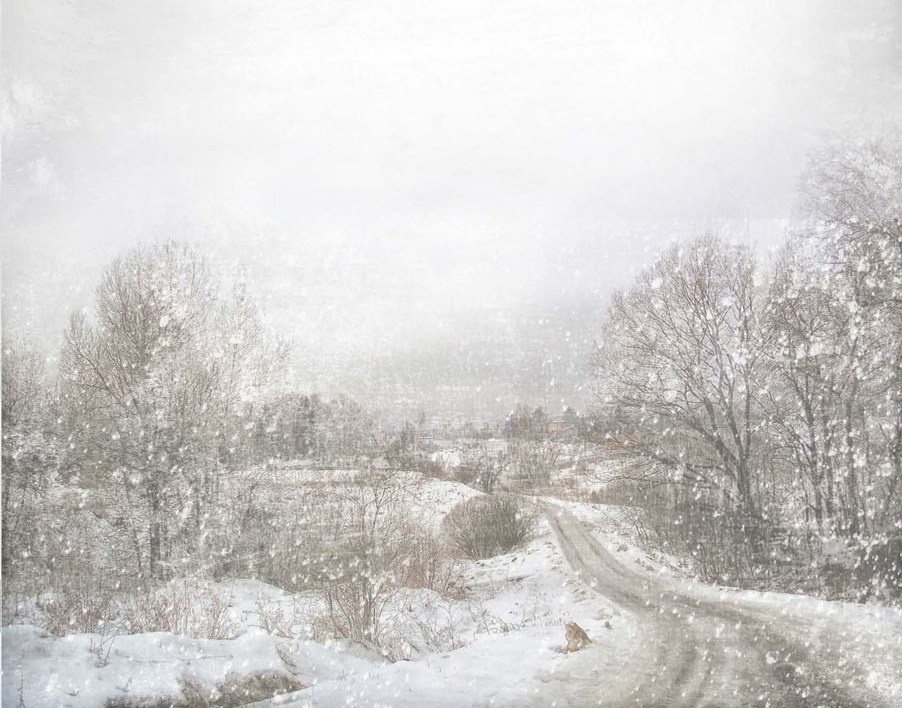A Country Large Enough to Hold Both Melancholy and Evanescence
Writer Sheila Packa on the histories, large and small, beautiful and violent but always in flight, in Michelle Matthees' latest collection of poems

The title of Flucht, Michelle Matthees’ book of poems published this year by New Rivers Press, is the German word for flight or escape. It is also the word used after WWII for the transfer of twelve million German-speaking people westward into Germany’s new boundaries. Matthees’ collection is a flight through difficult landscapes in the aftermath of war, through hunger and lack, to Vladivostok, from where she and her partner adopt a child from an orphanage. Hers is also a flight through Eastern Europe and its past.
The inscription, by Paul Celan, prepares the reader for this journey. In the first section of the collection, set in Siberia, Vladivostok, and Gdansk, the poet calls the landscape “at last, a country large enough to hold melancholy.” Snow is the backdrop; in the iron cold of winter, she finds shape-shifting and evanescence. She looks into the landscape and can see the past as well as the present. In the poem “Iconic,” there is a man diving for food in a dumpster, evoking the poet’s father, “physicist, baker, wild dove.” Confronting hunger and poverty might deter some people from a trip like this, but not Matthees. She makes a strong connection, as one must if one is here, in such a stark environment, to expand one’s family.
Beautiful metamorphoses happen in these poems: “A flock of doves condensed into vestments…” There is something winged in each of them, and even if a blue jay lays forsaken on a snow drift, there is something “hurled heavenward.”
In “The Rook Comes for a Visit,” the bird is like a magician, “hiding something under one wing,” as images flash: “loose dark jewel,” “ballerina en pointe,” “gypsy cards.” These are remarkably spare and polished poems. They are narrative moments in lovely music, touched by effective alliteration, assonance, and occasional rhyme. In “Danzig Within Gdansk,” there is the juxtaposition of white-haired men, vodka, blacksmiths, and rooks, and the devastating line: “how different destruction appears from above.” When one’s adopted child has lost her family and has been born into hardship, then one must reckon with the aftereffects. The poet writes, “a small boy throws rocks and misses// an iridescent pigeon” and at the end, “I come to forge such flight.”
While treading across violent and harsh places, Matthees collects small images, shards of the past, and sundry scraps to reconstruct the face of life. She sees its history, reckons with it. But she goes forward.
History, too, must be reckoned with: “I cannot believe in history / still the fisted buds flare.” The poet doesn’t mean she does not see history. The damage is clear. While treading across violent and harsh places, Matthees collects small images, shards of the past, and sundry scraps to reconstruct the face of life. She goes forward.
In her poems is a bit of travelogue, images from the oldest neighborhood in Kiev. Podil is the name of the place, but the word also means “something situated downward.” This was once the ghetto, a poor neighborhood, like those in many European cities where, historically, Jewish people were forced to live. At times, the poet’s white space on the page seems to represent the omissions and the silence that still haunt such places. Matthees is a witness, willing to stand amidst destruction and discern the transformation that happens in the flight of birds in open sky, or in the candle rays that become celestial. She is on the train, cabbages in the window, and sees “success and failure thrown past us// through the cattle car door to the dogs.”
In the book, the poet arrives back at home with a new daughter. Here are memories of love, as well as glimpses of the girl’s previous nightmarish hunger. The poems give glimpses of the way she has come through hard times, “[time spent between languages],” and end with the child asking the meaning of the word austere, in a poem titled “Memorizing Hayden.” The poet answers: “Empty, I say. Without.” It’s as if the poet has lit a match and it flares for a moment, and lights the wick of memory, the flight or escape. Afterward, the meanings of the word continue to flicker amidst the music.
This pivot between dark and light is what happens when one turns the final page of Flucht, after which a reader can be sure that over time the poems will echo with new meanings.